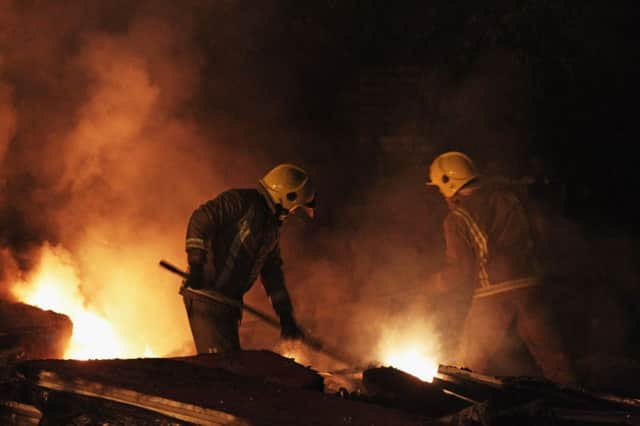The burning question of duty of care


One of the most combustible political issues of the day in England at present is the dispute between the Fire Brigades Union and the government over pensions and fitness tests for older firefighters.
North of the Border (and in Wales and Northern Ireland) the issue has been dampened down as a result of new proposals from the respective governments which appear to have appeased the FBU. But in England the Westminster government is holding firm.
Advertisement
Hide AdAdvertisement
Hide AdTherefore, south of the Border there was a four-day strike over the weekend in which October turned to November and a pensioner in the Midlands lost his life as the result of a fire.
However, that there is still peace between Holyrood and the FBU in Scotland does not diminish the significance of a judgment recently issued by the Court of Session about the duty of local fire brigades to put out fires.
The upshot of the judgment could be put as simply as this – the fire brigade has no absolute duty to attend to a burning building and put the fire out. However, if it does attend, the crews have a duty to take reasonable care in dealing with the outbreak.
The case came about as the result of a fire at a farmhouse in Dunbartonshire, which broke out on Halloween night, 2008. Strathclyde Fire Brigade was called out, and its crew extinguished the blaze.
The firefighters then checked the building and, having concluded that the fire was out, they left. Unfortunately, according to the owners of the farmhouse, the crew had failed to notice there were still some smouldering timbers within the roof and the next day the fire re-ignited, this time burning down the building completely.
Unsurprisingly, the owners of the farmhouse sued the Fire Brigade. Their case was that reasonably competent firefighters would have carried out a thorough examination of the building before leaving, and not have left anything smouldering. The pursuers contended that the brigade’s failure to do so had caused the fire to re-ignite, and so caused the building’s loss.
For its part, the Strathclyde Fire Brigade did not agree, and tried to stop the case on the grounds that the owners’ argument was bound to fail in law, even if they proved all their accusations.
The Brigade’s legal team argued that in general, nobody had a duty to rescue another person, or to save another person from harm. It followed that in the absence of a specific Act of Parliament saying otherwise, the basic law of the land imposed no duty to attend a fire, whether upon persons in general, or on the fire service in particular.
Advertisement
Hide AdAdvertisement
Hide AdThe only Act relevant was the Fire (Scotland) Act 2005, which imposed a duty on local fire boards to set up and operate a firefighting service and this – clearly – had been done. The Act also gave Fire Brigades a “power” to attend a fire, and the “discretion” to do everything reasonably believed to be necessary to extinguish a fire.
However, as there was no absolute duty to attend or do anything, the Brigade could not be liable in damages for failing to put out the fire. In ordering damages, the court would be creating an absolute duty to attend and extinguish fires, which parliament had not intended.
Householders will no doubt be relieved to hear that the court did not agree with this proposition. The judge accepted that in implementing duties imposed by parliament to institute, operate and maintain a fire service, the Fire Brigade had attended at the farmhouse to deal with a fire. It might be true that it had not been under an absolute duty to do so, but having attended, the brigade must then be taken to have assumed responsibility to exercise reasonable care in dealing with the fire.
Arguably such care had not been taken, so Lord Brailsford sent the case off to trial to determine exactly what had happened.
An easy and cynical response to this would be to say that fire brigades might now think it safer not to respond to emergency calls at all, rather than attend and risk being sued.
That, however, would not be correct. It is easy to see why parliament has not imposed an absolute duty on our overstretched service to attend at and extinguish all fires to which it is called since on many occasions, responding to a fire or getting there on time may simply not be possible.
Nevertheless, the fire brigades still have a duty to operate a firefighting service and to react reasonably when called upon for assistance.
And if the fire service was to adopt a policy of not attending at fires simply in order to avoid a risk of a lawsuit, they would no doubt be sued on other grounds.
• Richard Godden is a partner with Blackadders www.blackadders.co.uk